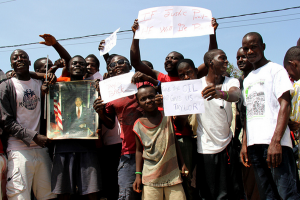
Supporters of Charles Taylor demonstrate the controversial nature of ICC work. Photo by tlupic via Flickr.
On 26th April, Charles Taylor was convicted for aiding and abetting war crimes and for crimes against humanity before the Special Court of Sierra Leone. Taylor is the first head of state to have been tried to completion before an international court, death by natural causes and assassinations having snatched others prior to their hearings.
In its short life, the International Criminal Court (ICC) has indicted 27 Africans from seven countries. These statistics have led to accusations of neo-colonialism from the African Union (AU). As institutional legitimacy is inherently linked with public perception, it may be a death knell for the ICC if the AU’s suspicions are found to have a basis.
What is the ICC?
The phenomenon of international criminalisation has proliferated international justice mechanisms. The ICC is a permanent court, situated in The Hague. Established in 2002 via the Rome Statute, it prosecutes individuals for four internationally recognised crimes: genocide; war crimes; crimes against humanity; and crimes of aggression. The ICC is a court of last resort, acting only when a national government lacks the will or capacity to prosecute.
Case-selection occurs via three referrals: by state parties, the Security Council or the Chief Prosecutor. International law depends on state consent, thereby the ICC’s jurisdiction is confined to states that have ratified the Rome Statute the number stands at 121, which does not include the US and other powerful states.
It is an inexplicable irony that Africa is blessed with an abundance of potential, yet is blighted by individuals who manifest humanity’s greatest follies. Justice for victims is undeniably one of the ICC’s aspirations. ICC involvement in Darfur, for example, is the paradigm of what the court ought to be investigating. The incumbent Chief Prosecutor, Fatou Bensouda, has stated, “all of the victims [in ICC cases] are African victims…they’re the ones who are suffering these crimes”.
On this view, the geographical consistency may be justified. Dapo Akande, Oxford Lecturer in Public International Law and one of the AU’s consultants on the ICC, believes that a case-by-case analysis is required. In the cases of Sudan and Libya, African members of the Security Council voted unanimously for referral; moreover, three of the African cases brought before the ICC have been self-referred, indicating cooperation.
But perhaps the crucial question is, ‘who has not been prosecuted?’. Although the ICC cannot be expected to prosecute every crime, it is undeniable that there are atrocities worthy of prosecution which remain unaccounted.
It is safe to say that no Russian leader will ever appear before an international court for Chechnyan war crimes. The same is perhaps true of China and Tibet, Gaza, or US and British generals for alleged war crimes in Iraq and Afghanistan. It is certainly not for want of heinous crimes that the ICC’s caseload has such a narrow focus.
The Fiction of International Justice
Politics is inextricably bound in case-selection. The key battleground is Security Council referral. The interests of powerful Security Council members, such as the USA, can influence the ICC’s caseload, whilst essentially remaining beyond the court’s reach. This perpetuates a chronic double standard. We have an ostensibly international court, without global jurisdiction.
International criminal justice is not blind to the considerations of powerful states but is dependent on their support. The EU contributes 60% of the court’s funds and the US has the capacity to influence decisions despite its lack of ratification. We cannot expect the US or NATO to be so frank as to state that Libyan intervention was influenced by Libya being Africa’s fourth-largest oil producer, or that it rests on an expanse of freshwater, the Nubian Sandstone Aquifer. The official line is humanitarian protection
ICC defenders may argue that the problem lies with the Security Council, not the Court. However, by virtue of the Council channelling cases to the ICC, it becomes the court’s problem.
Possible Solutions
Courtenay Griffiths QC (lead defence counsel for Taylor) in an interview for The Oxonian Globalist, stated that “the ICC is trying to be universal at a time the world is not ready for global jurisdiction.” He argues that the AU should have its own international court.
An African Court on Human and Political Rights already exists, but the grounds for the AU to break from the ICC have led to proposals of extending the court’s jurisdiction to international crimes. Yet this is the third jurisdictional amendment and the court has still not been ratified.
If we aspire towards grassroots healing, the ICC model is not ideal. The Hague is detached from local communities; the distancing effect breeds suspicions of imposing Western legal traditions on Africa. Moreover, as only a select few are prosecuted in the ICC, the process is often criticised as contrived.
To counter these issues, there could be greater emphasis on community justice, such as the gacaca courts in Rwanda. They should not be adopted to the exclusion of international tribunals, but they are worthy of fresh focus.
It is a stretch to say that the ICC is part of a new scramble for Africa, but with its wealth of potential, Africa is a source of mercenary interest for the international community. The selection of African cases and non-selection of others are symptomatic of a deeper issue.
There is a nexus between international law and politics, suggesting that objective justice might never be a reality. Our focus should be on strengthening local mechanisms, equipping them to facilitate progress away from past atrocities. Though the Taylor case has marked a milestone for Sierra Leone, this is not the first time an African leader has been subject to the international legal order. It will certainly not be the last.



